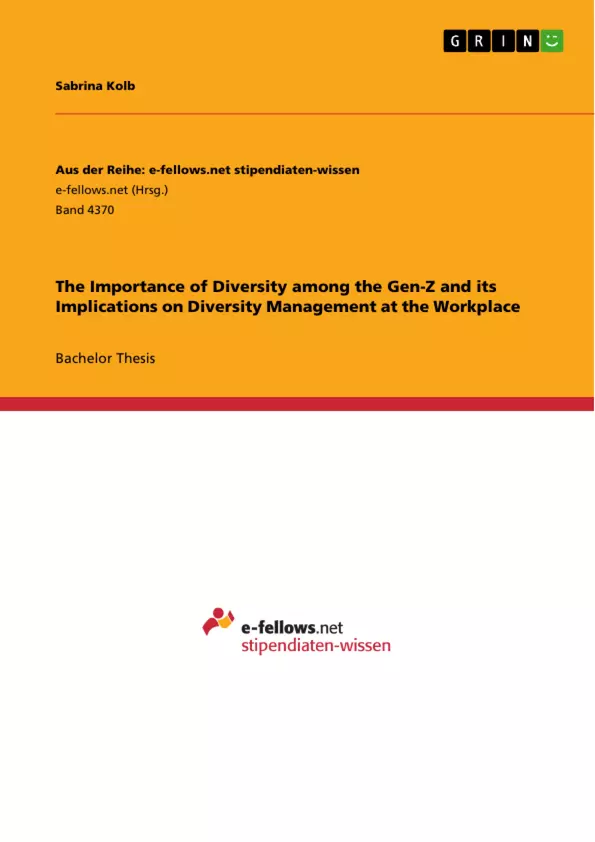A quantitative study among 114 individuals aged 17-26 with international, but mainly German nationality background was conducted. The results were gathered by an online survey during the period between 3rd April 2023 and 23rd April 2023.
The theoretical part composes the development of diversity management including its legal framework and discusses the concept of diversity, its dimensions, and management. Moreover, the necessity, benefits, and challenges of diversity management are noted. The paper also composes the process of effective diversity management and its implications for human resource management. The theoretical part additionally summarizes the key characteristics of the Gen-Z.
As a new generation is now entering the labor market, it is essential to know which role diversity plays in the Gen-Z's decision for an employer and how important the topic is for them as an employee. This knowledge thus enhances organizations' abilities to implement diversity management measures targeted to Gen-Z. This is decisive as in times of 'war for talents' attractive employer offerings can influence an applicant's decision for or against an organization.
Inhaltsverzeichnis (Table of Contents)
- Introduction
- Research background
- Research question
- Key concepts
- Demarcation
- Benefits of the thesis
- Internationality of the topic
- Diversity, workplace diversity management, and Gen-Z in the context of HRM
- Development of diversity management
- Legal evolution of diversity management
- Considerations of the Gen-Z from an HR perspective
- The concept of diversity and its dimensional scope
- The 'Big 8' of diversity
- Visible and invisible characteristics
- Four layers of diversity
- Relations-oriented, task-oriented, readily detected, and underlying diversity
- Approaches to diversity management
- Three cases of diversity
- Three perspectives on workforce diversity
- Necessity, benefits, and challenges of workplace diversity management
- Necessity of workplace diversity management
- Benefits of workplace diversity management
- Challenges of workplace diversity management
- Process of an effective diversity management
- Implications for HRM
- Research methods
- Research method
- Research design
- Population and sampling
- Data collection
- Reliability and validity
- Results
- Demographics
- Gen-Z's familiarity with the concept of diversity
- Gen-Z's attitudes towards diversity at the workplace
- Gen-Z's attitudes towards diversity management at the workplace
- Main tasks of workplace diversity management
Zielsetzung und Themenschwerpunkte (Objectives and Key Themes)
This thesis aims to understand the importance of diversity for Gen-Z in the workplace and how this impacts diversity management practices. The research analyzes Gen-Z's perspectives on diversity, their expectations of employers regarding diversity, and the role of diversity management in their decision-making process. This study contributes to understanding the evolving needs of a new generation entering the workforce and provides valuable insights for organizations seeking to attract and retain Gen-Z talent.
- The importance of diversity to Gen-Z and its impact on their career decisions.
- The role of diversity management in attracting and retaining Gen-Z talent.
- The key characteristics and expectations of Gen-Z regarding diversity and inclusion at work.
- The benefits and challenges of diversity management in the context of Gen-Z.
- The impact of diversity management on organizational culture and employee engagement among Gen-Z.
Zusammenfassung der Kapitel (Chapter Summaries)
The first chapter introduces the research background, question, key concepts, and the thesis' benefits. It also explores the internationality of the topic and the increasing importance of diversity management in the context of Gen-Z entering the workforce.
Chapter two delves into the development and legal evolution of diversity management, highlighting considerations for Gen-Z from an HR perspective. It further explores the concept of diversity, its dimensions, and approaches to diversity management. It also discusses the necessity, benefits, and challenges of workplace diversity management, examining its implications for human resource management.
Chapter three outlines the research methodology, including the research method, design, population and sampling, data collection, and reliability and validity. It provides a comprehensive overview of the study's design and execution, ensuring transparency and rigor.
Chapter four presents the results of the study, including demographic information, Gen-Z's familiarity with the concept of diversity, their attitudes towards diversity at the workplace and diversity management, and the main tasks of workplace diversity management. It provides valuable data and insights into the preferences and expectations of Gen-Z regarding diversity.
Schlüsselwörter (Keywords)
The primary focus of this thesis lies in the intersection of diversity, diversity management, and Gen-Z. The study explores the dimensions of diversity, its importance for Gen-Z in their career choices, and the implications for diversity management practices within organizations. It emphasizes the significance of fostering a diverse and inclusive work environment to attract, retain, and engage Gen-Z talent. Key terms and concepts include diversity, diversity dimensions, diversity management, Gen-Z, workplace diversity, inclusive work environment, and talent attraction and retention.
- Citar trabajo
- Sabrina Kolb (Autor), 2023, The Importance of Diversity among the Gen-Z and its Implications on Diversity Management at the Workplace, Múnich, GRIN Verlag, https://www.grin.com/document/1451452



